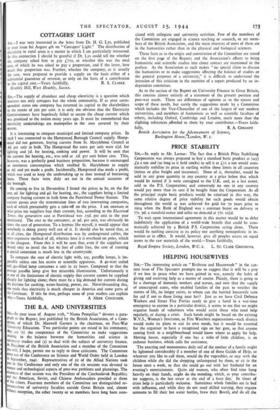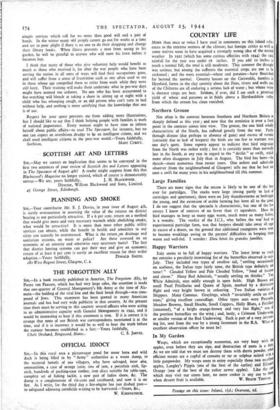HELPING HOUSEWIVES SIR, —The interesting article on "Birthrate and Housework" in
the cur- rent issue of The Spectator prompts me to suggest that it will be a pity
if we lose in peace what we have gained in war, namely the habit of giving and receiving help as a matter of course. Plainly, there is going to be a shortage of domestic workers and nurses, and now that the supply of unoccupied aunts, who enabled families of the past to weather the storms of life, no longer exists, to whom can the harried housewife turn for aid if not to those living near her? just as we have Civil Defence Workers and Street Fire Parties ready to give a hand in a war-time emergency to anyone in a particular district, it seems to me that we might organise bands of volunteers who would assist those who need help regularly, or during a crisis. Such bands might be based on the existing W.V.S., Women's Institutes, or Fire Watchers organisations—each district would make its plans to suit its own needs, but it would be essential for the organiser to have a recognised sign on her gate, so that anyone coming fresh to a neighbourhood would know where to apply for help. Moving house, especially if one has a tribe of little children, is an arduous business, which calls for assistance.
The exacting and monotonous daily toil of the mother of a family might be lightened considerably if a member of one of these Guilds of Help, or whatever you like to call them, would do the vegetables, or stay with the children while she did the shopping unhampered by them, or sit in the house once a week, so that she could go out with her husband for an evening's entertainment. • Quite old women, who often find time hang heavily on their hands, might do the mending, which, as your contribu- tor suggests, is the last straw at the end of a busy day. In times of crisis help is particularly welcome. Sometimes whole families are in bed with influenza, and while they do not need skilled nursing, they require someone to fill their hot water bottles, brew their Bovril, and do all the
simple services which call for no more than good will and a pair of hands. In the winter many old people cannot go out for weeks at a time and are in poor plight if there is no one to do their shopping and change their library books. When illness prevents a man from seeing to his garden, he will be grateful to anyone who will mow his lawn before it becomes hay.
I think that many of those who give voluntary help would benefit as much as those who received it, for after the war people who have been serving the nation in all sorts of ways will find their occupations gone, and will suffer from a sense of frustration such as one often used to see in those whose age compelled them to retire from work while they were still lusty. Their training will make them undertake what in pre-war days might have seemed too arduous. No one who has been accustomed to fire-watching will blench at taking a share in sitting up at night with a child who has whooping cough, or an old person who can't turn in bed without help, and nothing is more satisfying than the knowledge that one is of use.
Respect for your space prevents me from adding more illustrations, but I should like to say that I think helping people with families is work of national importance. Every woman ought to have time to inform herself about public affairs—to read The Spectator, for instance, but no one can expect an overdriven drudge to be an intelligent citizen, and we shall need intelligent citizens in the post-war world.—Yours faithfully,



























 Previous page
Previous page